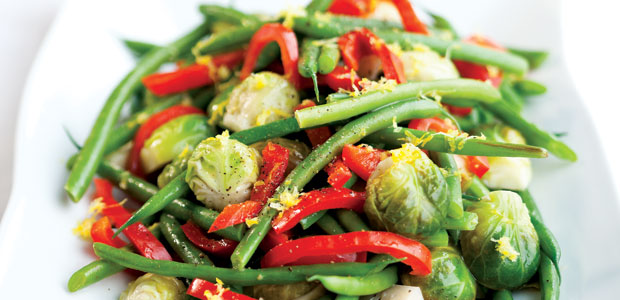Advertisement
A Fine Holiday Feast
Tradition with a twist

The much anticipated turkey feast is the pinnacle of holiday celebrations. The ritual of preparing and eating our favourite foods makes this meal so special.
Yet the traditional turkey dinner can be overly uniform in colour (too much beige!), and all the dishes share a similar softness in texture.
While you can’t really mess with the turkey, updating the sides is well within your rights!
Keep the traditionalist happy and don’t completely overhaul the menu. Add a fresh modern spin to the ingredients with bright notes of citrus, tangy mustard, and piles of vibrant green herbs. Keep veggies tender-crisp to the bite, and ditch the usual butter for zesty vinaigrette.
Most importantly, don’t forget to clink glasses and raise a toast to happiness and good health.
Recipes
- Brussels Sprouts, Beans, and Red Pepper
- Dijon-laced Mashed Potatoes and Parsnip
- Braised Cabbage and Beets
- Lemon, Pine Nut, and Bread Stuffing
- Cranberry Meringue Pie
Let’s talk turkey
The big bird is the centrepiece of the holiday table, so choosing a turkey is a serious purchase. With so many different labels and types out there, it’s good to know what’s available and how to treat it. No matter what type of bird you buy, choose organic, where possible, and select one that’s big enough to feed the crowd and ensure leftovers. A good rule of thumb is to allow 3/4 lb (340 g) per person.
Fresh turkeys
Fresh turkeys are untreated with solutions and have never been chilled below 26 F (-3 C). Since they’ve never been frozen, the texture of the meat stays firm, yet moist and tender.
Heritage turkeys
Purebred birds produce a stronger, gamier flavour. They are smaller in size and leaner than regular farm-raised turkeys.
Organic turkeys
Hormone-free turkeys have been raised on organic feed that doesn’t contain animal byproducts. Available fresh and frozen.
Kosher turkeys
Antibiotic-free turkeys are allowed to roam freely and are usually grain fed. Birds are processed under rabbinical supervision and often treated with salt brine, keeping meat moist during roasting.
Defrosting your turkey
If your turkey is frozen, thaw before roasting. Defrost in the refrigerator, allowing about 1 day per 5 pounds, or submerge in cold water for 30 minutes per pound, changing water every 30 minutes.
Cooking your turkey
To ensure your turkey is cooked, it’s best to use a thermometer. Insert an instant-read thermometer in thigh (be sure not to touch bone). It should read 180 F (82 C). Also check the stuffing: insert thermometer into centre of stuffing; it should read 165 F (74 C).




